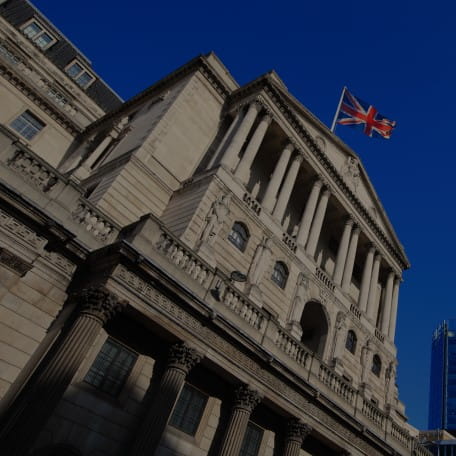Last week saw a surprise fall in inflation data and the Bank of England deciding not to hike rates, with its chief economist describing a Table Mountain plateau in rates rather than a sharp ascent to (and descent from) a Matterhorn peak. Should investors be excited about a turning point in the battle against inflation?
The annual rate of UK inflation moderated to 6.7% in August, down from 6.8% in July and significantly better than economists’ forecasts of an acceleration to 7.0%. Core inflation, which excludes food, energy, alcohol and tobacco, was down even more markedly, from 6.9% to 6.2%.
Financial markets reacted swiftly to this surprise, with key moves including housebuilder share prices jumping as expectations of Bank of England base rates fell. Derivatives markets had previously been pricing an 80% chance of the Bank of England pushing through its 15th successive base rate increase to 5.5%. This dropped to 50% in the wake of the inflation data.
Phil Milburn, co-head of the Global Fixed Income team saw the data as good news for investors: “Overall, I would characterise this undershoot of inflation relative to expectations as being a very positive development. The only negative points are that the absolute rate of inflation is still far too high, and a couple of volatile items in the core services measure have flattered the figures.
However, the breadth of the deceleration in inflation is increasing, so even if volatile items do rebound in upcoming months the broader downward trend should remain intact.”
The following day the Bank of England (BoE) chose to break its run of hikes by holding rates steady at 5.25%. It was a close vote with the Bank’s rate-setting committee being split 5-4, with the dissenters all preferring a 25bps hike.
In explaining its decision the committee said "...the decision on whether to increase or to maintain bank rate at this meeting had become more finely balanced between the risks of not tightening policy enough when underlying inflationary pressures could still prove persistent, and not placing sufficient weight on the impact of the previous tightening that was still to come through on activity and inflation.”
The potential for a lagged policy impact is something the Sustainable Future fixed income team has been factoring into its portfolio positioning: “What has surprised many investors this year is how robust the underlying economy has been despite the monetary policy tightening over the last year or two. One potential reason for this is that changes to central bank base interest rates typically affect the economy in a lagged manner.
For example, according to the BoE, the proportion of fixed-rate mortgages has increased from around 30% in 2010 to around 85% presently. Homeowners on fixed-rate mortgages will have been protected against the impact of higher rates, but this will change as they refinance their fixed deals over the coming months and years.”
The Sustainable Future fixed income team expect total returns from the asset class to be strong over the next 12-18 months. They have positioned their portfolios to be long duration – a measure of interest rate sensitivity – meaning they should benefit if they are correct in their view that yields will fall.
Their base case on a 12-month view includes 10-year gilts returning to a yield of 3.25% and corporate credit spreads tightening by 25bps on a 12 month view.
Milburn has also positioned the Global Fixed Income team’s portfolios to be long duration, taking on about twice the benchmark’s level of rate sensitivity (having for many years been well below it due to unattractively low bond yields). However, Milburn now sees increasing value outside of the UK:
“There has been recent outperformance from UK government bonds versus the US equivalent, to the point that the 10-year UK bond now yields less than the US.
The UK does have lower economic growth, but it also has higher inflation as well as some risk premium needed for the institutional instability we have seen over the last few years of political chaos. So we have reallocated some UK exposure towards US and German government bonds. We still retain around a quarter of our duration exposure in the UK though.”
While the decision to hold rates steady has been seen as the headline event in the Bank’s announcement, Milburn finds some cause for consternation further down the statement.
Having enacted a massive bond-buying programme (quantitative easing) in the aftermath of the global financial crisis in order to keep borrowing rates low and stimulate the economy, the Bank is now unwinding this by selling these bonds back (quantitative tightening). The Bank announced last week that it will increase rate at which it reduces its bond holdings from £80 billion a year to £100 billion. While around half of the £100 billion reduction will be achieved by simply allowing bonds to redeem at the end of their life, the other half will be sales. The problem is, most of these bonds sit at losses compared with when the Bank purchased them due to the sharp increase in yields over the last 18 months.
Milburn explains his frustration with the scheme: “I have been quite vocal about how the Bank of England was slow to react to the inflationary problem, such that an initial supply side shock to prices broadened out to be a much more endemic phenomenon. This has led to interest rates having to be raised much higher than they would have otherwise been if the Bank of England had reacted sooner. However, this is nothing compared to my frustration with the probable losses that will arise from the unwind of quantitative easing (QE).”
“While the Bank’s bond-buying initially led to paper profits for the government, which ultimately underwrote the scheme, it is now leading to significant loses for the public purse. Bank of England data shows that, using market yields at the end of June, the total loss is currently on track for £150bn
I don’t think the losses will turn out to be quite as large, as I expect the Bank to cut rates next year by more than factored into these estimates. But the losses will still be eye-wateringly large”
While bond investors will be encouraged that inflation appears to now be heading in the right direction, it still remains very high in absolute terms and there is a long road ahead to the Bank’s 2% inflation target. It seems that the regular scrutiny of inflation data and Bank of England statements will continue for some time yet.
KEY RISKS
Past performance is not a guide to future performance. The value of an investment and the income generated from it can fall as well as rise and is not guaranteed. You may get back less than you originally invested.
The issue of units/shares in Liontrust Funds may be subject to an initial charge, which will have an impact on the realisable value of the investment, particularly in the short term. Investments should always be considered as long term.
The Funds managed by the Global Fixed Income Team:
Consider environmental, social and governance (""ESG"") characteristics of issuers when selecting investments for the Funds. May hold overseas investments that may carry a higher currency risk. They are valued by reference to their local currency which may move up or down when compared to the currency of a Fund. Hold Bonds. Bonds are affected by changes in interest rates and their value and the income they generate can rise or fall as a result; The creditworthiness of a bond issuer may also affect that bond's value. Bonds that produce a higher level of income usually also carry greater risk as such bond issuers may have difficulty in paying their debts. The value of a bond would be significantly affected if the issuer either refused to pay or was unable to pay. May encounter liquidity constraints from time to time. The spread between the price you buy and sell shares will reflect the less liquid nature of the underlying holdings. May, under certain circumstances, invest in derivatives, but it is not intended that their use will materially affect volatility. Derivatives are used to protect against currencies, credit and interest rate moves or for investment purposes. There is a risk that losses could be made on derivative positions or that the counterparties could fail to complete on transactions. The use of derivatives may create leverage or gearing resulting in potentially greater volatility or fluctuations in the net asset value of the Fund. A relatively small movement in the value of a derivative's underlying investment may have a larger impact, positive or negative, on the value of a fund than if the underlying investment was held instead. The use of derivative contracts may help us to control Fund volatility in both up and down markets by hedging against the general market. The use of derivative instruments that may result in higher cash levels. Cash may be deposited with several credit counterparties (e.g. international banks) or in short-dated bonds. A credit risk arises should one or more of these counterparties be unable to return the deposited cash. May invest in emerging markets which carries a higher risk than investment in more developed countries. This may result in higher volatility and larger drops in the value of the funds over the short term. May be exposed to Counterparty Risk: any derivative contract, including FX hedging, may be at risk if the counterparty fails. May target an absolute return. There is no guarantee that an absolute return will be generated over the time period stated in the fund objective or any other time period. The risks detailed above are reflective of the full range of Funds managed by the Global Fixed Income Team and not all of the risks listed are applicable to each individual Fund. For the risks associated with an individual Fund, please refer to its Key Investor Information Document (KIID)/PRIIP KID.
DISCLAIMER
This is a marketing communication. Before making an investment, you should read the relevant Prospectus and the Key Investor Information Document (KIID), which provide full product details including investment charges and risks. These documents can be obtained, free of charge, from www.liontrust.co.uk or direct from Liontrust. Always research your own investments. If you are not a professional investor please consult a regulated financial adviser regarding the suitability of such an investment for you and your personal circumstances.
This should not be construed as advice for investment in any product or security mentioned, an offer to buy or sell units/shares of Funds mentioned, or a solicitation to purchase securities in any company or investment product. Examples of stocks are provided for general information only to demonstrate our investment philosophy. The investment being promoted is for units in a fund, not directly in the underlying assets. It contains information and analysis that is believed to be accurate at the time of publication, but is subject to change without notice. Whilst care has been taken in compiling the content of this document, no representation or warranty, express or implied, is made by Liontrust as to its accuracy or completeness, including for external sources (which may have been used) which have not been verified. It should not be copied, forwarded, reproduced, divulged or otherwise distributed in any form whether by way of fax, email, oral or otherwise, in whole or in part without the express and prior written consent of Liontrust.










